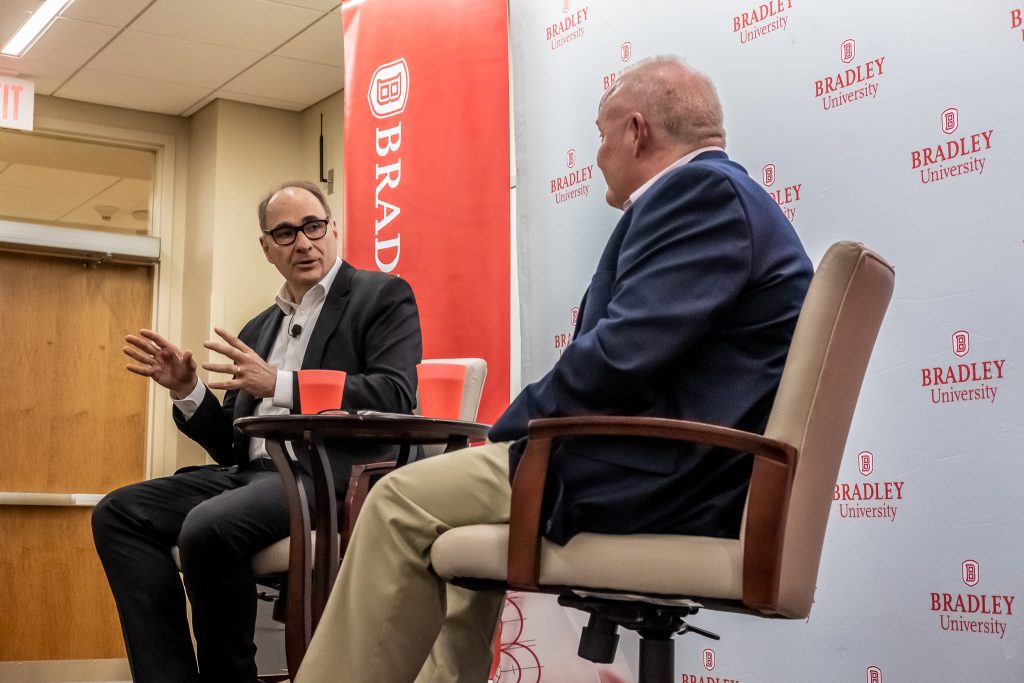
There is a lot behind a political campaign, especially President Barack Obama’s presidential run. Bradley students had a chance to hear a little bit about what went on behind Obama’s campaign from his chief strategist, David Axelrod.
Axelrod spoke to a crowd of Bradley students, faculty and alumni on Thursday about how he came to meet Obama and be a part of his campaigns.
Axelrod said he first met Obama when he returned to Chicago after attending Harvard Law School. Obama was working on a voting initiative and Axelrod was introduced to him through Bettylu Saltzman, who was plugged into Democratic politics in Chicago.
“She said to me ‘I just met the most remarkable young man and I think you ought to meet him,’” Axelrod said. “I said ‘What’s his name?’ and she said ‘Barack Obama.’ I said ‘That’s an unusual name, why do you want me to meet him?’ and she said ‘This sounds crazy, but I think he could be the first black president of the United States.’”
This conversation happened in 1992, which is why Axelrod said Saltzman knows how to pick winners.
“I always say whenever I go to the track now, I take her with me,” Axelrod said.
Axelrod said the main thing that separated Obama from other politicians is the reason he got into public service.
“In my view, the world of politics divides into two component parts,” Axelrod said. “The first and larger cohort of people who want to run for office want to be something. The smaller and more admirable cohort runs for office because they want to do something. They see it as an opportunity to make a real difference. He was clearly in that second group.”
Axelrod said Obama had the ability to relate to anyone. He spoke of a time during Obama’s U.S. Senate run when he was worried he wouldn’t do well in southern parts of Illinois. Obama was doing well and Axelrod explained why.
“This was a guy that felt comfortable in any room that he walked into,” Axelrod said. “Especially at a time that our country was so divided, to have that quality was so special and important.”
After losing a 2000 Democratic primary for a U.S. House of Representative by 30 points, Obama’s political career was in question. In 2002, Obama called Axelrod. Obama told him he was not going to give up.
“I’ve got one more race left in me,” Axelrod said. “Michelle has given me dispensation for one more race. I told her if that didn’t work out, I would go and get a real job.”
The race he had left in him was for U.S. Senate, a race Obama won. He then went on to run for president just four years later. Axelrod served as chief strategist and media advisor for Obama. He said Obama was at a disadvantage by being thrust into the spotlight right away.
“Running for president is really hard. You make mistakes. You generally are a much better candidate by the end then you are at the beginning,” Axelrod said. “Most candidates get to toil in obscurity for a while and work their material through. He was right on Broadway. All the critics were there. Everything he said was scrutinized.”
After becoming the President-elect, Axelrod said he noticed a change in Obama.
“You could see the weight of the world had descended on his shoulders,” Axelrod said. “I didn’t see the guy I had known in all the years leading up to that until January 2017 when he was no longer president. Anyone who takes on those burdens understands what they are getting into, but ours were particularly complicated.”
Axelrod’s daughter suffers from epilepsy and he said legislation passed with Obama that was personal for him.
“It took 18 years to get the seizures to stop. We almost went bankrupt,” Axelrod said. “When the Affordable Care Act was passed, I sobbed that night. I remembered what my family had gone through. I knew that because of what we had done, there was families that wouldn’t have to go through that.”
Axelrod mentioned a Bradley alumnus and member of the board of trustees as someone he has enjoyed working with.
“I am here because of Ray LaHood, who is one of the finest people that I ever met,” Axelrod said. “He and Bob Michel before him represented the kind of politics we should aspire to, putting country over party.”
“Its always nice to have bipartisanship by having Ray LaHood presenting him,” said Christian Pelaez, a sophomore political science major and member of the College Republicans. “It was a great experience seeing both sides of the story.”
Looking to the future, he said he believes Biden may emerge in the Democratic Party for the 2020 presidential election.
“He was an extraordinary asset to President Obama,” Axelrod said. “They had the best relationship of any president and vice president certainly in our lifetime, maybe in history. It is not always a president and vice president become closer over the course of a presidency.”
As a former political columnist for the Chicago Tribune, Axelrod addressed his worries about the future of political journalism.
“My concern is local journalism,” Axelrod said. “With all the competing networks on cable television, local newsrooms have lost ad revenue. We need lights shown on city halls and statehouses.”
According to sophomore political science major Terence McReynolds, Axelrod’s conversation was a good educational experience for students looking to get into politics.
“He is a phenomenal speaker and has had a phenomenal career,” McReynolds said. “He was very honest about his life’s work and how he sees not just the political culture, but how society as a whole is moving and how politics is shaping itself around it.”




